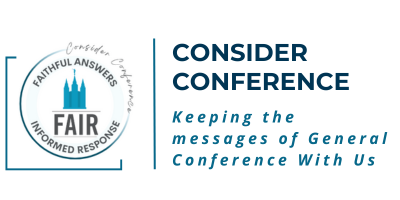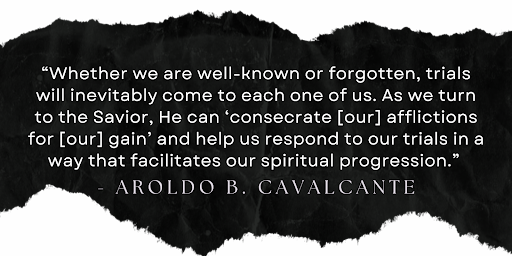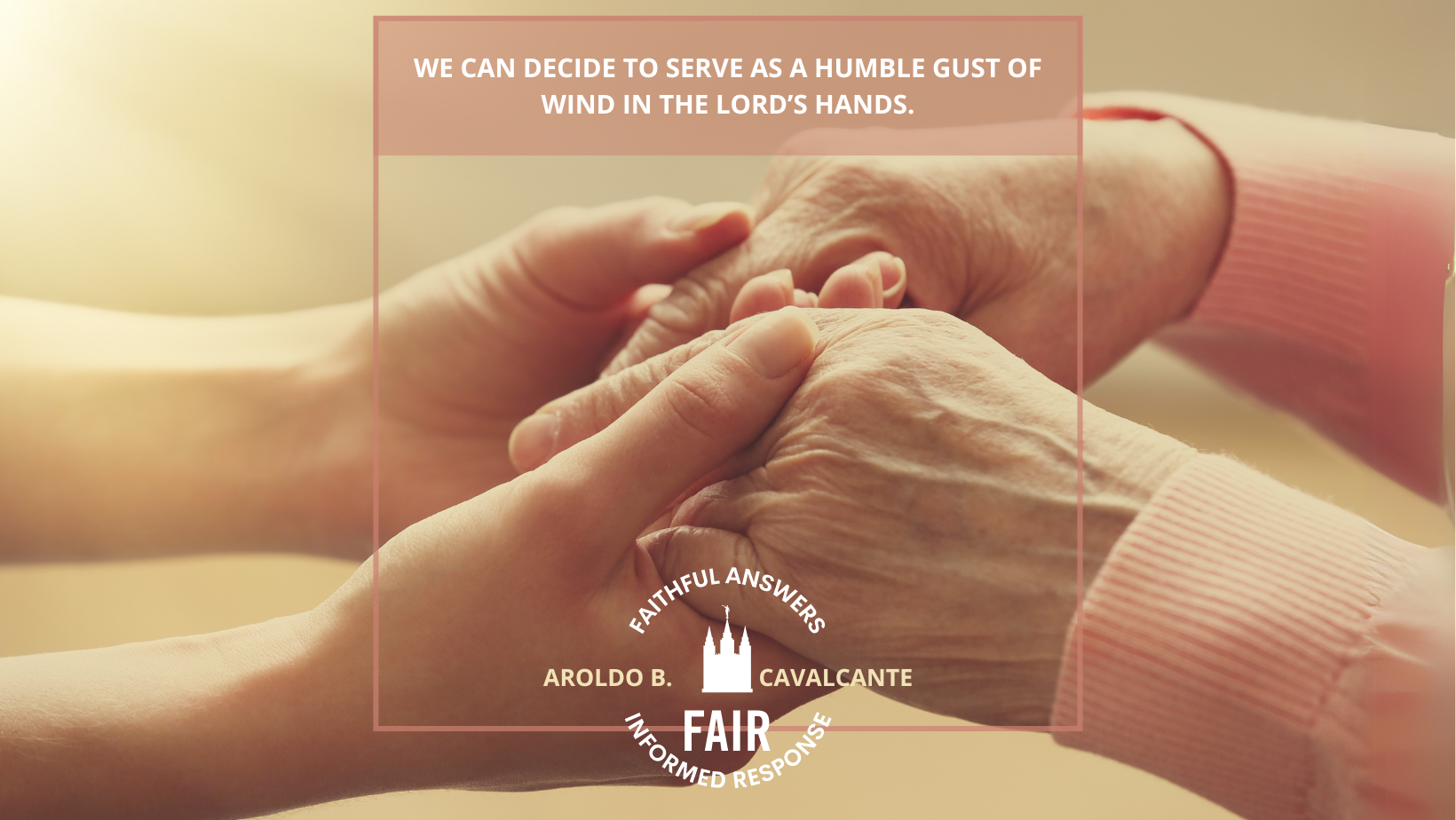
How often do we feel “forgotten” in a world that measures our value by appearance, status, or wealth? Or perhaps we know someone who, despite their faith and goodness, remains unseen and unrecognized.
In his General Conference address, The Wind Did Never Cease to Blow, Elder Aroldo B. Cavalcante reminds us of our divine mandate to seek out and support the unseen, misunderstood, and overlooked as we progress along the covenant path. Using powerful examples of selfless service and divine assistance, Elder Cavalcante’s message aligns closely with key teachings in Come, Follow Me this week, where we explore how The Restoration offers personal access to divine blessings and guidance.
Questions, Misconceptions, and Criticisms
Misconception: Faithfulness Prevents Trials
A common misconception, often tied to the “prosperity gospel” mindset, is the belief that if we keep the commandments and remain faithful, we will avoid trials and suffering. Some interpret prosperity and ease in life as evidence of God’s favor, while trials are seen as a sign of disfavor or unfaithfulness. This belief can lead to disillusionment when faithful individuals face significant hardship.
- Response: Elder Cavalcante directly addresses this misunderstanding by emphasizing that trials are a natural part of life for everyone, regardless of status or faithfulness. In this context, the promise is not an absence of hardship but rather that our trials can be sanctified and lead us closer to God when we turn to Christ. This teaching aligns with the experiences of early Saints who endured significant persecution despite their faithfulness and dedication to the gospel.
Criticism: The Church Teaches Conditional Love
Critics sometimes claim that the Church’s emphasis on covenants implies that God’s love is conditional—that only those who keep the commandments are truly loved or valued by Him.
- Response: Elder Cavalcante’s message contradicts this criticism by emphasizing that God knows and loves each individual, regardless of their current circumstances. His example of the elderly residents in the nursing home illustrates how God’s love extends to all His children, including those society may overlook. While covenants invite us to draw nearer to God and receive specific blessings, God’s love remains constant for all His children.
Misconception: Only Church Leaders Can Offer Meaningful Service
Some may believe that significant contributions in the Church can only be made by those in formal leadership positions. This can discourage members who feel unqualified or overlooked from fully participating in the Lord’s work.
- Response: Elder Cavalcante’s story about calling a counselor who initially seemed an unlikely candidate illustrates that meaningful service is not restricted to those with visible qualifications. The Lord often chooses individuals who may seem weak or unprepared by worldly standards but are strong in faith and willingness.
Elder Cavalcante’s experience highlights how everyone can contribute, regardless of their background or perceived limitations.

Apologetic Applications of Doctrine
Defending Divine Doctrines
The Restoration teaches that the Savior remains actively involved in guiding us—much like the “furious wind” that carried the Jaredites to the promised land. Elder Cavalcante draws on the metaphor of this relentless wind, symbolizing the continuous and often unseen help we receive from the Savior. Here’s how this defends core beliefs:
- Personal Guidance and Divine Involvement: The metaphor of the wind illustrates the LDS belief that God remains actively engaged in our lives, providing ongoing guidance and strength. This defends against criticisms that God is distant or uninvolved in human affairs, reaffirming the Restoration’s message of a personal, loving Father.
- Sanctification Through Trials: By emphasizing that trials can be consecrated for our gain, Elder Cavalcante reinforces the doctrine of sanctification through adversity. This defends against misconceptions that suffering is meaningless or purely punitive, showing instead that it can lead to spiritual growth and progression.
Application:
- The promise of personal progression and divine assistance underscores our belief in a loving, embodied God and challenges critiques around Theosis (or deification). Through serving as “the wind,” we participate in God’s work – offering us a concrete way to apply this doctrine in everyday life.
Historical and Doctrinal Connections
Contextual Background
Elder Cavalcante’s emphasis on missionary service reflects a recurring theme throughout gospel dispensations—taking the gospel to others. This practice serves a two-fold purpose: first, it refines and purifies the missionary, creating a more spiritual and Christlike person; second, it teaches us to reject exceptionalism in every form, helping us to see all individuals as members of God’s family, each of inestimable worth.
Historically, prophets have called missionaries to serve not only to spread the gospel but also to transform their own hearts and minds. Examples like Nephi, Jeremiah, and Moses remind us that feelings of inadequacy are common when embarking on the Lord’s work, yet the Lord promises to strengthen those He calls. As President Nelson reaffirmed, missionary service in our dispensation is a vital priesthood responsibility and a powerful opportunity for all who are able.

Living Apologetics
Practical Application
Elder Cavalcante reminds us that we are to serve as “a gust of wind in the Lord’s hands.” Practical ways to do this include:
- Volunteer Service: Seek local opportunities where you can uplift and care for others. This could be with the elderly, those struggling with loneliness, or marginalized individuals.
- Respectful Dialogue: When discussing the doctrines of God’s nature or eternal progression, consider a gentle approach, emphasizing love, agency, and divine potential.
Faith in Action
- Suggested Actions:
- Reflect on past trials and consider how they have contributed to your spiritual growth.
- Offer empathy and support to those around you who may feel overwhelmed by their personal challenges.
- Look for ways to show unconditional love to those who may feel forgotten or marginalized.
- Consider how you can be a missionary in your daily interactions by living gospel principles and serving others.
- Application Ideas:
- Set aside time to study The Restoration of the Fulness of the Gospel of Jesus Christ and consider the divine purpose behind each doctrine.
- Reflect in a journal on how you might better recognize and support the unseen or misunderstood in your life.
- Remember that God qualifies those He calls, and willingness is more important than worldly qualifications.
Quick Reference: Key Defenses and Facts
Defensive Highlights
- Divine Doctrines: The doctrine of Theosis invites us to consider how God’s plan enables our eternal progression, as taught through Christ.
- Historical Support: Examples like the Jaredites’ journey emphasize reliance on divine guidance, a recurrent theme in LDS history.
- Service as a Covenant Duty: Following King Benjamin’s example, service reflects our commitment to Christ, clarifying that covenants extend beyond belief to action.
Top Apologetic Facts
- Missionary Work Refines and Transforms: The emphasis on missionary service throughout gospel dispensations highlights its dual role in spreading the gospel and refining the missionary, aligning with the principle of sanctification through service.
- Personal Revelation and Guidance: LDS doctrine emphasizes ongoing personal revelation, as shown in the calling of individuals who may seem unqualified by worldly standards but are strengthened by God, defending against criticisms of a distant or uninvolved deity.
- Equality and Worth of Souls: The rejection of exceptionalism and the emphasis on the equal worth of all individuals reflect core LDS beliefs in the universal family of God and the invitation for all to partake in His blessings.
Conclusion
Elder Cavalcante’s reminder to “be the wind” encourages each of us to adopt a discipleship that actively looks for those in need. Reflect on this week’s Come, Follow Me lesson: How does the restored gospel invite you to know and help those around you, as God knows and helps you?

Each of us—and those around us—faces our own storms of opposition and waves of trials that submerge us daily. But “the wind [will not] cease to blow towards the promised land … ; and thus [we shall be] driven forth before the wind.”
Each of us can be a part of this wind—the same wind that blessed the Jaredites in their journey and the same wind that, with our help, will bless the unrecognized and forgotten to reach their own promised lands.
I testify that Jesus Christ is our Advocate with the Father. He is a living God and acts as a strong wind that will always guide us along the covenant path. In the name of Jesus Christ, amen.
Share your insight
Your thoughts and experiences can help others along their journey. Share them below, and let’s continue this conversation on the power of belonging to His Church.
The Consider Conference series by FAIR offers an in-depth look at recent General Conference talks to help members of the Church of Jesus Christ of Latter-day Saints navigate common questions, misunderstandings, and criticisms. Each post provides doctrinal insights, historical context, and practical ways to apply gospel principles in everyday conversations. Through this series, we hope to equip readers with faith-promoting resources that encourage thoughtful reflection, respectful dialogue, and a stronger foundation in gospel truths, fostering both personal conviction and meaningful discussions with others.
